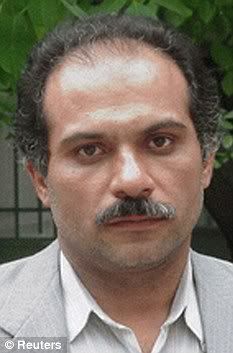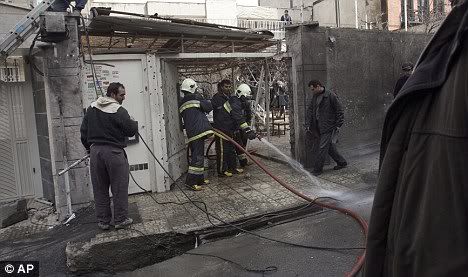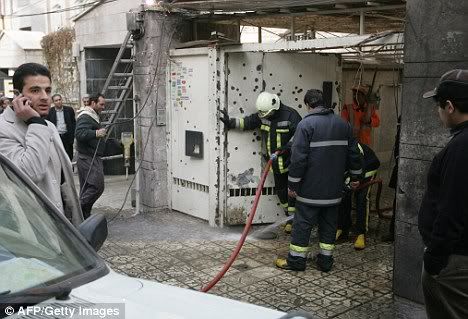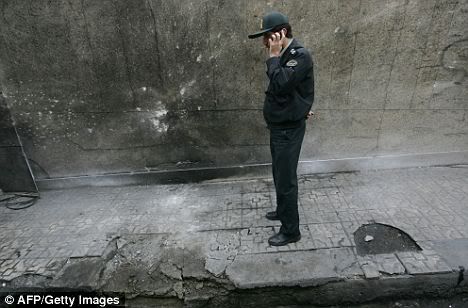
Tehran University professor Massoud Ali-Mohammadi who was killed by a bomb in front of his home

Iranian fire fighters wash the scene of a bombing in northern Tehran's Qeytariyeh neighborhood this morning

Professor Massoud Ali Mohammadi was killed as he was climbing into his car when a nearby parked motorbike exploded

An Iranian security agent speaks on his mobile phone at the scene of the explosion which killed Professor Mohammadi
ran has blamed the U.S. and Israel for the assassination of one of the country's top nuclear scientists.
Massoud Ali Mohammadi was killed this morning by a bomb-rigged motorcycle parked outside his Tehran home.
He has just left the house on his way to work when the remote-controlled explosion went off.
Websites linked to the country's clerical leadership blamed the killing on an armed Iranian opposition group under the direction of Israeli agents.
But Massoud Ali Mohammadi was a vocal supporter of opposition leader Mir Hossein Mousavi after the disputed presidential election result last June.
The blast shattered the windows of Mohammadi's home in northern Tehran's Qeytariyeh neighborhood and left the pavement outside smeared with blood and strewn with debris.
It is unclear whether the 50-year-old was actively involved in the Atomic Energy Organisation of Iran, which controls the country's nuclear programme.
'Signs of the triangle of wickedness by the Zionist regime (Israel), America and their hired agents, are visible in the terrorist act,' the Foreign Ministry said.
'Such terrorist acts and the apparent elimination of the country's nuclear scientists will definitely not obstruct scientific and technological processes,' it added.
A US government spokesman described the accusations as 'absurd'.
Another Iranian nuclear scientist, Shahram Amiri, disappeared in June while on a pilgrimage to Saudi Arabia.
Amiri's disappearance raised questions about whether he defected and gave the West information on Iran's nuclear program, but Iran's foreign minister accused the U.S. of helping to kidnap him and asked for his return.
Amiri worked at a university linked to the elite Revolutionary Guard military corps and his wife said he was researching medical uses of nuclear technology at a university.
In 2007, state TV reported that another nuclear scientist, Ardeshir Hosseinpour, died as a result of gas poisoning.
A one-week delay in the reporting of his death prompted speculation about the causes, including that Israel's Mossad spy agency was to blame.
The United States and its allies in Europe have been pushing Iran to halt its uranium enrichment program, a technology that can be used to make fuel for power plants but which also offers a possible pathway to weapons development.
Israel has threatened to take military action if diplomatic efforts fail.
U.S. Secretary of State Hillary Rodham Clinton yesterday said the Obama administration has concluded that the best way to pressure Iran to come clean on its nuclear ambitions is to impose sanctions aimed at the country's ruling elite.
'It is clear that there is a relatively small group of decision makers inside Iran,' Clinton told reporters traveling with her on the first leg of a nine-day trip across the Pacific.
'They are in both political and commercial relationships, and if we can create a sanctions track that targets those who actually make the decisions, we think that is a smarter way to do sanctions. But all that is yet to be decided upon.'
Iran is already under three sets of U.N. sanctions for refusing to freeze its enrichment work.
On Tuesday, a spokesman for Iran's Foreign Ministry, Ramin Mehmanparast, told reporters that sanctions would not work.
'This is not a constructive attitude,' he said. 'I do not think the issue can be solved this way. Instead, our nuclear rights should be respected.'
Tehran prosecutor Abbas Jafari Dolatabadi confirmed that Ali Mohammadi had been killed and added that there had been no arrests.
Iran denies having any intention to produce weapons and insists its nuclear work only has peaceful aims, such as energy production.
Mohammadi was the author of several articles on quantum and theoretical physics in scientific journals.
He also was a member of some academic associations focusing on experimental science, but he did not appear to have any high-profile role in promoting Iran's nuclear programme.
He received his doctorate in 1992 from the Sharif University of Technology in Tehran.
The assassination of one of Iran's nuclear scientists is an indication of the country's advancement in different scientific fields, the head of a leading scientific establishment in the capital said Tuesday.
Professor Masoud Ali-Mohammadi, a lecturer at Tehran University, was killed by a booby-trapped motorbike blast in the Iranian capital earlier in the day. The explosion took place near the professor's home in the Qeytariyeh neighborhood of northern Tehran.
"Our scientific expertise has prompted our enemies to target our scientists," Mohammad-Javad Larijani, who heads the Institute for Research in Fundamental Sciences, said.
Ali-Mohammadi had cooperated with the institute that offers various advanced PhD degrees in areas such as Mathematical Logic and Plasma Physics among others.
The enemy, the Berkeley-educated mathematician said, has made a colossal mistake as the death of one scientist will only motivate tens of other Ali-Mohammadi's to rise in his place.
Iran's Foreign Ministry said that it found traces of US and Israel's involvement in the assassination of an Iranian nuclear physics scientist.
"Primary investigations into the assassination revealed signs of the involvement of the Zionist regime [Israel], the US and their allies in Iran," ministry spokesman Ramin Mehman-Parast said.
Mohammad Marandi, a professor at Tehran University, told Press TV that Ali-Mohammadi's colleagues at the capital's most prestigious university believe the attack was orchestrated by the West.
"It is widely believed among collogues that he was assassinated by terrorist organizations probably supported by the United States and with connections with the Americans and the Israelis under different names," he said.
"Unfortunately when it comes to Iran anything is acceptable in the eyes of the foreign powers."
---
----
Read more about Iran Nuclear Plan





---------
------------
RELATED POSTS:-
- Al qeada suicida bom kill 127 in Baghdad.Trio of boms
- Keep us safe or we're off for good — UN pulls out staff after attack
- Car bom kills 90 as Hillary Clinton visits Pakistan
- At least 155 killed in two Baghdad suicide bombings Al Qaeda linked group claims responsibility
- Scenes of carnage in Peshawar bazaar Pakistan
- US condemns bombing outside Indian embassy in Kabul
- Taliban attack Indian Embassy with Car bomb
- Terror Suspect Had Bomb Guide, Authorities Say
- Devastating suicide strikes show Taliban expansion-Afghan spy boss killed in Taliban suicide attack
- Hamid Karzai accused by rival candidate of rigging Afghanistan election
- Fresh violence strikes Baghdad
- British Sunday newspaper journalist killed by roadside bomb in Afghanistan
- 43-year-old Theresa Still of Altoona was found death.
- Gordon Brown leads furious outcry as China executes British drugs mule by lethal injection
- Real Rainman. A super savant super memories.Mind grow sharper as age but heart die at 58
- 1 dead, 5 hurt in CA Coast Guard boat collision
- Gun battle in Middle of New York.Police shot dead unlicenced cd seller .
- Tiger tamer mauled in front of live audience.Fighting for life now.
- Ohio executes inmate with untried injection method-Single injection.
- Robber shot dead part time money charger worker.Stole $10 000 pounds and laptop.Shot dead cold blood.





0 comments:
Post a Comment